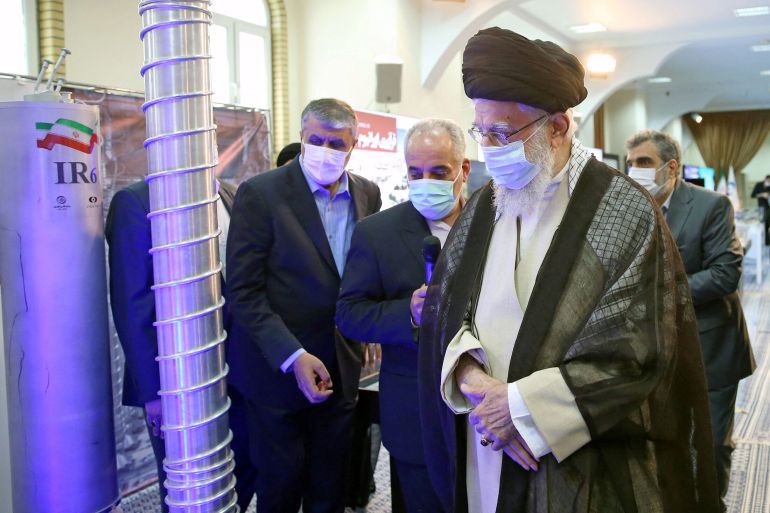Nuclear bomb fears are a false ‘excuse’: Iran’s Khamenei
Iranian leader said some international stakeholders cannot be trusted, but that cooperation with IAEA must continue.

Tehran, Iran – Iran’s supreme leader, Ayatollah Ali Khamenei, has said claims that Tehran may pursue a nuclear weapon are a false “excuse” that untrustworthy international stakeholders use.
He told a group of nuclear officials and scientists in Tehran on Sunday that Islamic values prevent Iran from pursuing a weapon of mass destruction.
Keep reading
list of 4 itemsTape shows Trump saying he kept classified document on Iran: CNN
Iran to reopen embassy in Saudi Arabia after seven years
US says Iran is helping Russia build drone manufacturing facility
“If it wasn’t for that and we wanted to do it, they wouldn’t have been able to stop it, just as they haven’t been able to stop our nuclear advances and won’t be able to,” Khamenei said.
“The excuse of a nuclear weapon is a lie, this is not the issue, something else is at play. They know that nuclear advancement will be a key for progress in other issues of the country.”
Iran currently enriches uranium to 60 percent, which is a short technical step from the over 90 percent purity required for a bomb, and is said to have amassed enough fissile material for more than one bomb. But Western intelligence sources and monitors say there have been no signs that Tehran is currently working on producing a bomb.
The Iranian supreme leader said two decades of challenges with world powers emanating from the country’s nuclear programme have shown that some of them, along with the International Atomic Energy Agency (IAEA), cannot be relied upon to fully implement their commitments.
“One of the achievements of this 20-year challenge was that we realised we can’t trust their word,” he said.
Khamenei, however, emphasised that cooperation with the United Nations’ nuclear watchdog must continue within the framework of safeguards agreements and in compliance with a law passed by the Iranian parliament in late 2020 that paved the way for advancing Iran’s nuclear programme.
“You might make agreements on some issues, there is no problem with that, but make sure the infrastructures of the nuclear industry remain untouched,” he said, after visiting an exhibition that included a display of advanced Iranian IR-6 centrifuges.
Iran and the IAEA reached an agreement to strengthen their cooperation in early March, in order to resolve cases that Tehran has maintained need to be finalised before the country’s 2015 nuclear deal with world powers – which the United States unilaterally abandoned in 2018 – can be restored.
The agency said earlier this month it has no further questions at the moment on two of four cases around nuclear sites after Iran provided plausible answers.
This meant that the Western parties to the nuclear deal, who have repeatedly blamed Tehran for insufficient cooperation with the watchdog, did not table a censure resolution at the latest IAEA board meeting last week, as they had on two previous occasions.
But stakeholders appear no closer to restoring the Joint Comprehensive Plan of Action (JCPOA), as the nuclear deal is formally known, amid media reports this week hinting that progress has been made on an agreement, or that a temporary agreement may be in the works.
Iran’s President Ebrahim Raisi and his French counterpart Emmanuel Macron had a phone call on Saturday that touched on the nuclear issue.
The Iranian president’s office said Raisi told Macron during the 90-minute call not to “politicise” or engage in “unconstructive” behaviour in the nuclear case, while Macron’s office said he discussed France’s concern with the trajectory of the Iranian nuclear programme.
Meanwhile, Washington continues to impose sanctions on Tehran, the latest targeting the Iranian missile programme earlier this week after the Islamic Revolutionary Guard Corps unveiled the country’s first hypersonic ballistic missile.
In October, the UN resolutions underpinning the nuclear deal are set to lift a number of restrictions on the development of ballistic missiles, an issue that could further concern the West.